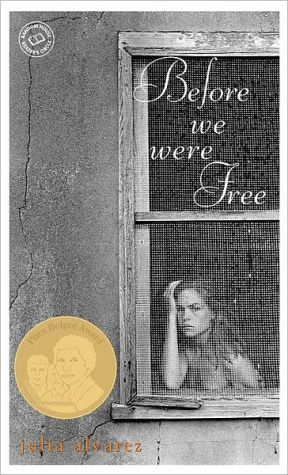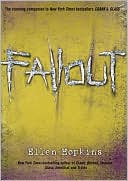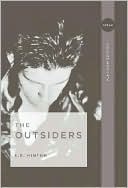Before We Were Free
Anita de la Torre never questioned her freedom living in the Dominican Republic. But by her 12th birthday in 1960, most of her relatives have emigrated to the United States, her Tío Toni has disappeared without a trace, and the government’s secret police terrorize her remaining family because of their suspected opposition of el Trujillo’s dictatorship.\ Using the strength and courage of her family, Anita must overcome her fears and fly to freedom, leaving all that she once knew behind.\ From...
Search in google:
Anita de la Torre never questioned her freedom living in the Dominican Republic. But by her 12th birthday in 1960, most of her relatives have emigrated to the United States, her Tío Toni has disappeared without a trace, and the government's secret police terrorize her remaining family because of their suspected opposition of el Trujillo's dictatorship. Using the strength and courage of her family, Anita must overcome her fears and fly to freedom, leaving all that she once knew behind. From renowned author Julia Alvarez comes an unforgettable story about adolescence, perseverance, and one girl's struggle to be free.Publishers WeeklyIn what PW called "pitch-perfect narration," in a starred review, a 12-year old girl living in the Dominican Republic in 1960 relates the terrors of her country's regime and the attempt to overthrow Trujillo's dictatorship. Ages 12-up. (Apr.) Copyright 2004 Reed Business Information.
Chapter 3\ Now that the SIM are gone and the Washburns are living next door, Mami and Papi decide we can go back to school.\ But first, Mami sits us down. "I don't want you talking about what happened with your friends, she warns.\ "Why not?" I want to know.\ Mami quotes one of Chucha's sayings, "'No flies fly into a closed mouth.'" The less said, the better. "And that includes talking to Susie and Sammy," Mami adds, eyeing Lucinda and me.\ Lucinda has become friends with Sammy's older sister, just as I have with Sammy. Poor Mundín is stuck without a new friend. But he says he doesn't care. Papi is giving him extra responsibility, taking him to work the days we aren't in school. Some nights after supper, Mundín gets to drive the car up and down all the driveways that connect the houses in the compound.\ "If anything happens to me," Papi says from time to time, ((you're the man of the house."\ "If he wants to be the man of the house, he's going to have to stop biting his nails," Mami says, breaking the tense silence that follows such remarks.\ The night before going back to school, I spend a long time picking out my outfit, as if I'm getting ready for the first day of classes. Finally, I settle on the parrot skirt Mami made me in imitation of the poodle skirt all the American girls are wearing. But even after everything is laid out, I feel apprehensive about going back. Everyone will be asking me why I've been absent for over two weeks. I myself don't understand why we weren't able to go to school just because the SIM were on our doorstep. After all, Papi still went to work every day. But Mami has refused to even discuss it.\ I go next door to Lucinda's room. My sister is setting her hair in rollers. Talk about torture! How can she sleep with those rods in her hair? For her outfit, she also picked out her skirt just like my parrot skirt, but she insisted on a poodle when Mami made hers.\ "Linda Lucinda," I butter her up. "What are we going to tell everyone at school? You know they're going to be asking us where we were."\ Lucinda sighs and rolls her eyes at herself in the mirror. She motions for me to come closer. "Don't talk in here," she whispers.\ "Why?" I say out loud.\ She gives me a disgusted look.\ "VAy?" I whisper in her ear.\ "Very funny," she says.\ I sit around until she's done with her rollers. Then she jerks her head for me to go out on the patio, where we can talk.\ "If people ask, just tell them we had the chicken pox, Lucinda says.\ "But we didn't."\ Lucinda closes her eyes until she regains her patience with me. "I know we didn't have the chicken pox, Anita. It's just a story, okayr,\ I nod. "But why didn't we really go to school?"\ Lucinda explains that after our cousins' departure, too many upsetting things have been happening and that's why Mami hasn't\ wanted us out of her sight. Raids by the SIM, like the one we had; arrests; accidents.\ "I heard Papi talking about some accident with butterflies or something, I tell her.\ "The Butterflies," Lucinda corrects me, nodding. "They were friends of Papi. He's really upset. Everyone is. Even the Americans are protesting."\ "Protesting what? Wasn't it a car accident?"\ Lucinda's rolls her eyes again at how little I know. "'Car accident" " she says, making quote marks in the air with her fingers, as if she doesn't really mean what she's saying.\ “You mean, they were-"\ "Shhh!" Lucinda hushes me.\ Suddenly, I understand. These women were murdered in a pre, tend accident! I shiver, imagining myself on the way to school, tumbling down a cliff, my parrot skirt flying up around me. Now I feel scared of leaving the compound. "So why send us to school at all?"\ "The Americans are our friends," Lucinda reminds me. "So for now, we're safe."\ I don't like the sound of "for now," or how Lucinda makes those quote marks in the air again when she says "we're safe."\ Mami is actually a lot calmer now that the Washburns have moved in. Not only is it nice to have the special protection of the consul next door, but the extra rent money is coming in handy. Construcciones de la Torre isn't doing well. Everything is at a standstill because of the embargo, whatever that is. We're having to cut corners and sell off our uncles' cars and the furniture from my grandparents' house from when Papito was making money. I offer to let Mami sell my brown oxfords and old-fashioned jumpers I don't like. But she smiles and says that won't be necessary just yet.\ Lucinda and I aren't the only ones to make friends with our neighbors. Manii starts a canasta group to introduce Mrs. Washbum to other Dominican ladies and help her practice her Spanish. Two or three tables are set up on the back patio. The ladies chat in lowered voices. Every once in a while, the new maid, Lorena, comes around with a tray of lemonades or clean ashtrays. Although Mami is trying to save money, there's too much work keeping up with all the houses in the compound for just Chucha. So Mami has hired the young girl to help out. But we have to be extra careful what we say around her.\ "Why?" I ask. "Because she's new?"\ Mami gives me a look that has "Cotonita! " written all over it. After I told Mami that her nickname for me was really getting on my nerves, she promised to stop using it. But she still lets me know with her eyes when I'm speaking up too much. "Just be careful what you say," Mami repeats.\ I guess you can't trust a maid who hasn't changed anyone's diaper in the family!\ Actually, I can't really complain about being asked to keep secrets. Sammy and I haven't said a word about our discovery. Twice we've gone back to Tfo Toni's casita only to find the door closed and the padlock in place. But there have been fresh footprints leading to and from the casita and a pile of cigarette butts, as if Someone without an ashtray has thrown them out the window.\ "Very fishy," Sammy observes, an expression which he says means that something strange is going on.\ Our compound is crawling with fish, all right.
\ Publishers WeeklyIn what PW called "pitch-perfect narration," in a starred review, a 12-year old girl living in the Dominican Republic in 1960 relates the terrors of her country's regime and the attempt to overthrow Trujillo's dictatorship. Ages 12-up. (Apr.) Copyright 2004 Reed Business Information.\ \ \ \ \ KLIATTIn a preliminary letter to the reader, Alvarez, the author of How the García Girls Lost Their Accents and other well-known novels, notes that this "is a story that I would have lived had I not escaped to this country [the U.S.] when I was ten years old." The dedication is "For those who stayed," and it is indeed a tale of what happened to those Dominicans in 1960 - 61 who were not as lucky as Alvarez. Twelve-year-old Anita has always loved her life in the Dominican Republic, living happily among extended family in a compound, but over a period of a few months, as the dictatorship of General Trujillo and his secret police became harsher and harsher, all but Anita's nuclear family depart hurriedly for the United States. Anita's favorite uncle goes into hiding, and her father and his friends hold secret meetings. The American consul—and his handsome young son, just Anita's age—move in next door to Anita's family, and they feel somewhat protected by his presence. But as the underground resistance movement grows, a movement in which Anita's father plays an important and dangerous role, Anita realizes that their lives are in peril. Not even the maid can be trusted, and gradually their freedom is eroded. When the dictator is murdered, the secret police arrest Anita's father and uncle, and Anita and her mother must hide in a friend's closet for weeks until they can be spirited out of the country. Safe at last in New York, they are devastated when they learn what happened to their loved ones back in the Dominican Republic. There are parallels here to Anne Frank's diary, as Anita, concealed in a closet and frightened for her life, tells of her feelings in her own diary. This is aheart-wrenching tale and Alvarez makes it ring true, as Anita gradually discovers what is going on in her country against the backdrop of her own coming-of-age. An Author's Note at the end supplies some historical background. An important novel for every YA collection. KLIATT Codes: J*—Exceptional book, recommended for junior high school students. 2002, Random House, Alfred A. Knopf., 160p. map., \ — Paula Rohrlick\ \ \ VOYAIn the early 1960s, Alvarez's family moved to New York from the Dominican Republic, a country experiencing civil unrest and revolution under the authority of General Trujillo. An earlier Alvarez novel, How the Garcia Girls Lost Their Accents (Algonquin, 1991), chronicles the lives of the young Garcia girls as they adjust to life in the United States. This book tells the story of their cousin, Anita, who celebrates her twelfth birthday in the year Trujillo is deposed. Her cousins, sister, and friends leave the Dominican Republic, her school closes, and she becomes aware of her family's role in the underground movement. Anita also experiences the pains of growing up—crushes, arguments with her sister, and getting her period. The novel unfolds slowly. Told from Anita's point of view, there are hints of unrest, such as a visit from the secret police, but Anita is kept from understanding what is happening. Consequently, she is naïve, and her story reflects her shallow views. As Anita becomes more aware of the underlying political dangers, she develops into a more reliable narrator, telling a compelling story. Particularly engaging is the diary she keeps while she and her mother are in hiding, revealing the fear of exposure and the boredom of being locked away. The ending emphasizes the sacrifices and the rewards of revolution. Although this book will take a while to involve readers, eventually the story will hold them until the last page. An author's note describes Alvarez's experience and why she wrote the novel. 2002, Knopf, 160p, \ — Mary Ann Harlan\ \ \ \ \ School Library JournalGr 6-10-By the morning of her 12th birthday, in December, 1960, Anita de la Torre's comfortable childhood in her home in the Dominican Republic is a thing of the past. The political situation for opponents of the dictator Rafael Trujillo has become so dangerous that nearly all of her relatives have emigrated to the U.S., leaving only her uncle, T'o Toni, somewhere in hiding, and her parents, still determined to carry on the resistance. Over the next year, the girl becomes increasingly aware of the nature of the political situation and her family's activities. Once her father's cotorrita, or talkative parrot, she grows increasingly silent. When the dictator is assassinated, her father and uncle are arrested, her older brother is sheltered in the Italian Embassy, and Anita and her mother must go into hiding as well. Diary entries written by the child while in hiding will remind readers of Anne Frank's story. They will find Anita's interest in boys and her concerns about her appearance, even when she and her mother can see no one, entirely believable. Readers will be convinced by the voice of this Spanish-speaking teenager who tells her story entirely in the present tense. Like Anita's brother Mund'n, readers will bite their nails as the story moves to its inexorable conclusion.-Kathleen Isaacs, Edmund Burke School, Washington, DC Copyright 2002 Cahners Business Information.\ \ \ \ \ Kirkus ReviewsA 12-year-old girl bears witness to the Dominican Revolution of 1961 in a powerful first-person narrative. The story opens as Anita's cousins (the Garcia girls of Alvarez's 1991 adult debut, How the Garcia Girls Lost Their Accents), hurriedly pack to leave the country. This signals the end of childhood innocence for Anita. In short succession, her family finds the secret police parked in their driveway; the American consul moves in next door; and her older sister Lucinda is packed off to join her cousins in New York after she attracts the unwelcome attention of El Jefe Trujillo, the country's dictator. Anita's family, it seems, is intimately involved with the political resistance to Trujillo, and she, perforce, is drawn into the emotional maelstrom. The present-tense narrative lends the story a gripping immediacy, as Anita moves from the healthy, self-absorbed naïveté of early adolescence to a prematurely aged understanding of the world's brutality. Her entree into puberty goes hand in hand with her entree into this adult world of terror: "I don't want to be a se-orita now that I know what El Jefe does to se-oritas." According to an author's note, Alvarez (How T'a Lola Came to Visit Stay, 2001, etc.) drew upon the experiences of family members who stayed behind in the Dominican Republic during this period of political upheaval, crafting a story that, in its matter-of-fact detailing of the increasingly surreal world surrounding Anita, feels almost realer than life. The power of the narrative is weakened somewhat by the insertion of Anita's diary entries as she and her mother take shelter in the Italian Embassy after her father's arrest. The first-person, present-tense construction of thediary entries are not different enough from the main narrative to make them come alive as such; instead, the artifice draws attention to itself, creating a distraction. This is a minor quibble with a story that imagines so clearly for American readers the travails of all-too-many Latin nations then and now. (Fiction. 10-14)\ \








